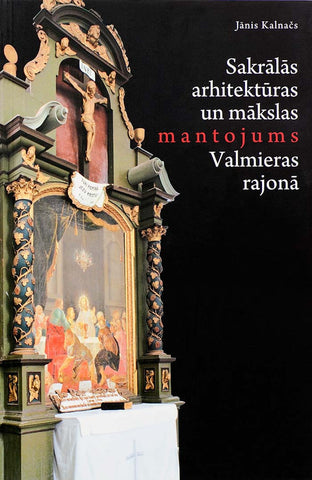
This book continues the series of publications "Monuments of Art in Latvia" that began with the book "The Heritage of Religious Architecture and Art in Daugavpils District" by Rūta Kaminska and Anita Bistere (2006).
The heritage of religious art and architecture includes both well-known and unnoticed architectural and artistic values. In view of the small number of churches in Valmiera District, included in this book are the churches of all denominations about which more or less definite information is available. Also, in contrast to other volumes in this series, this book also covers mortuary chapels and tombs. The basis for this is the historical link between burial practices and churches. This link is expressed in the medieval tradition of burial inside the church. There is also the original connection between cemeteries and the mortuary practices of particular denominations.
This book has come together as a compilation of material, evaluating the factual data through careful acquaintance with a range of different sources, from medieval chronicles and 17th–18th century church inspection reports to modern-day studies, checking the descriptions in previous works (for example, the facts and assertions that tend to travel from one publication to the next, but which are not always correct), examining the opinions expressed by historians of art and architecture, which are sometimes open to dispute, and striving to trace the process of study and preservation of the religious cultural heritage. Particular attention has been focussed on drawings, plans and photographs kept in various repositories – the State Historical Archives of Latvia, the Museum of the History of Riga and Navigation, the Departments of Manuscripts and Rare Books of the Latvian Academic Library, the Baltic Central Library, Rundāle Palace Museum, Valmiera Local History Museum and the Rūjiena Exhibition Hall – and in congregational and private collections. By utilising as illustrative material not only postcards and recent photographs, but also older and rarer images, it was possible to trace the changes that have affected churches, their surroundings and interiors.
The author of the book Jānis Kalnačs (born 1956 in Pārdaugava, Riga). Art historian, Dr. art., Professor of Vidzeme University of Applied Sciences. From 1979 to 2008, in parallel with other work, he worked as Cultural Monuments Inspector for Valmiera District. His research interests and practical work relate to the history of art and culture in Latvia (especially the 1930s and artist Kārlis Padegs, the Nazi German occupation, unusual personalities, lost art collections, the relationships between power and art), preservation of the cultural heritage and cultural tourism.